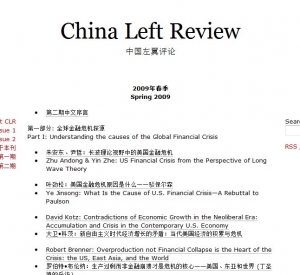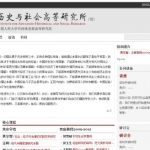
China Study Group is pleased to announce the launch of the Spring, 2009 bilingual web-journal China Left Review. Issue No. 2 examines the the global financial crisis of 2008-2009, and focuses on China’s role and reaction. Our purpose is to stimulate discussion and collaboration between left-leaning scholars and activists in Chinese and English-speaking worlds. We seek to do this by compiling, translating, and commenting on a variety of works related to controversial and pressing social issues.

Just spotted: the Institute for Advanced Historical and Social Research - a new interdisciplinary research institute in Beijing. Philip Huang, Wang Hui and Cui Zhiyuan are listed as core faculty, and He Xuefeng, Peng Yusheng, Wang Mingming and Wang Shaoguang are visiting.
Published in: journal Inter-Asia Cultural Studies, Volume 10, Issue 1 March 2009 , pages 138 - 153
Abstract
NSC (the Chinese government’s campaign to ‘construct a New Socialist Countryside’) aims to increase agricultural productivity, improve the rural environment, and promote peasant welfare (fuli).1 In order to achieve this goal, peasants must get organized. Since most young peasants leave the countryside to work in the city, elderly people have become the main agents of production and life in the villages, so peasant organization must involve the organization of the elderly. Experiments in NSC …
In December 2008 the Financial Times spoke of an irony of history if the Communist Party of China (CPC), that had survived the collapse of the socialist Eastern Block in 1989 (and the social upheaval of Tian’anmen), would collapse through the events that come along with the global crisis of capitalism in 2009. Another commentator said, China’s politicians, faced with a possible social explosion of workers, peasants and unemployed, were already in a “state of panic”. But this is not just about China and the rule of the CPC. The question is whether the current crisis and subsequent social turnover can lead to the formation of a global working class that can finish off the capitalist mode of production world-wide. For any answer to that question class struggles in China play an important role.